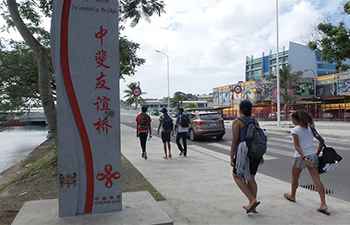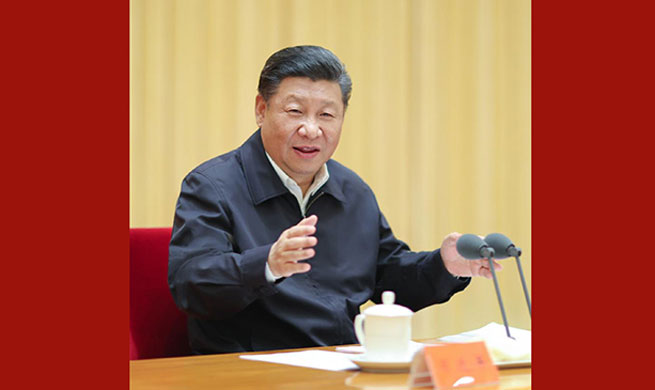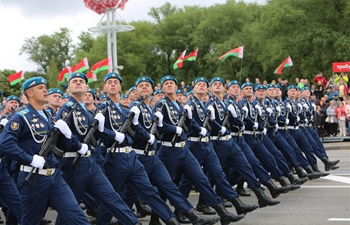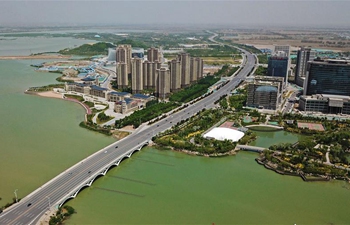LONDON, July 4 (Xinhua) -- As Britain heads towards leaving the European Union (EU), British universities need to think positively about a future outside the bloc, the President & Vice-Chancellor of the University of Leicester told Xinhua in a recent interview.
Britain's higher education community mostly backed remaining as an EU member, but by a 52-48 percent margin, the British public voted to leave.
Academic support for remaining in the EU was partly driven by universities and colleges being involved in pan-European research as well as co-operation, with fears in Britain it could be at risk after Brexit.
Professor Paul Boyle, a renowned geographer who has been at the helm at Leicester since 2014, has been heavily involved in pan-EU research projects.
He has also spearheaded close co-operation with China, and especially with Dalian University of Technology with a joint partnership signed between the two which led to Leicester opening its first international campus at Panjin in 2017
Leicester's links with China played a part in helping shape Boyle's confidence for a future in British academia outside the EU.
BREXIT
"For a variety of reasons it is no surprise universities campaigned to remain," he said. "From a university point of view I am optimistic we will continue to collaborate with Europe. Indeed, it would be a serious problem for the UK if this were not the case."
Boyle added that, if there is a positive from Brexit, leaving will encourage UK universities to think more keenly about which international partnerships they should focus additional attention upon in the future.
"Yes, we want to continue to collaborate with Europe, but Brexit is an opportunity as well," Boyle said. "It's a chance to sit back and think hard about what more we can make of those international collaborations we perhaps haven't put quite as much as energy into because we have been primarily focused on Europe."
Boyle added: "I want to see collaboration across the world wherever it is relevant, and a more fluid and flexible funding system."
He will be keeping a watchful eye as the Brexit train continues its journey, concerned about the 17 percent of his academic staff and researchers who come from EU countries.
Boyle sees the academic world as an important voice in the Brexit negotiations.
The Vice-Chancellor said: "Academics understand what's going to be lost, and it's not just about money. This is about international partnerships and about bringing the best minds together wherever they might be in Europe. We can grapple with some of the most pressing global problems, at a UK level."
"We have plenty of good scientists in Britain and we have plenty of funding opportunities in the UK, but for some of the biggest problems you need to bring together the best minds wherever they are," he added.
Boyle said after having worked in a national research funding agency he is very keen on those agencies encouraging more fluidity and more mobility of great minds.
"We need to bring the best Chinese minds, the best American minds or European minds together to solve problems, rather than seeing ourselves as rather isolated, separated organizations," he said.
ACADEMIC
Boyle noted the focus currently is primarily on teaching students, but he wants to see expansion into deep research collaboration. He welcomed a commitment by the British government to invest more in academic-led research programs.
"When you look at the quality of publications produced, compared to the amount of money spent by various countries on science, Britain comes out top. It shows we are producing really high quality science, but more can be done as the government has acknowledged. Some countries like Singapore, South Korea as well as a number of European and Scandinavian countries put a higher proportion of their budgets into funding science and innovation than we see in the UK. It is great news that the UK government has recently committed to increasing spending, with more already put into research and innovation. So I think the signs are good, and we just have to make sure investment matches our potential."
On university rankings Boyle believes students use a range of things when making their choices.
"The Chinese students we have here at Leicester are a fantastic group and make a huge difference to our campus. They are really thoughtful, very hard working students, very globally minded and very engaged in social media.
"When you think about those students and what made them choose this particular university, I suspect many have looked partly at rankings. What they also do is listen to their peers, look at social media, look at the way students studying here reflect on their institution. They look at whole range of things that help them make decisions about whether this is the place where they feel comfortable."
Leicester's university is a very international community in a very international, multi-cultural city.
Boyle said: "It's the community who established us and we must never forget that. When our university opened there were just nine students, and today we have many thousands of students so we are a very different place.
"We are much more global in outlook, we have the balance that comes with a community focus along with that global outlook."
With ambitious plans for its second century the university aims to continue making global news.













